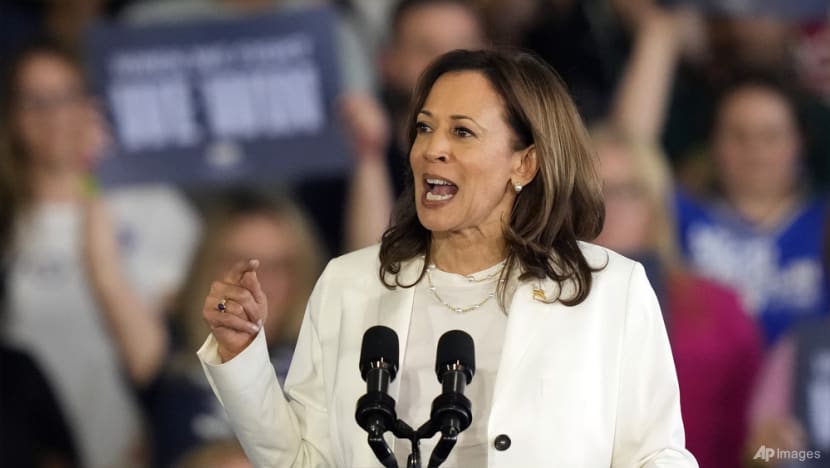Commentary: Why doesn’t Kamala Harris talk about climate change?
Americans place global warming high on their list of worries but low on their list of voting priorities, says Mark Gongloff for Bloomberg Opinion.

FILE - Democratic presidential nominee Vice President Kamala Harris speaks at a campaign rally, Aug 7, 2024, in Romulus, Michigan. (AP Photo/Carlos Osorio, File)
NEW YORK: Politicians usually pay attention to issues that two-thirds of Americans agree on because politicians want votes, and paying attention to popular things wins votes. Usually.
Climate change is somehow different. We don’t talk about climate change.
Vice President Kamala Harris, who cast the deciding vote in Congress for the Inflation Reduction Act (IRA), the most consequential climate change Bill in US history, doesn’t mention it much on the presidential campaign trail.
Climate did get a cameo in her post last week celebrating the anniversary of the IRA’s passage. But her stump speech, which is still developing, doesn’t yet include the words “climate change”.
Harris has picked up a line from her running mate, Governor Tim Walz of Minnesota, whose campaign introduction speech this week talked about “the freedom to breathe clean air and drink pure water”. But that’s only conceptually related to climate change. Heck, even Donald “Chinese hoax” Trump talks about clean air and water.
This reticence is notable, considering how often voters say they are worried about climate change. Two-thirds of Americans consider the issue at least somewhat important to them personally, according to a survey this spring by the Yale Program on Climate Change Communication. That result is consistent with polls conducted by Gallup and Pew.
Two-thirds of Americans also support clean energy and favour government subsidies to build more of it, according to Pew surveys, and nearly three-quarters want the US involved in international efforts to combat global heating.
According to one Gallup poll, 60 per cent believe, correctly, that the effects of climate change have already begun. More and more Americans are experiencing extreme-weather events and connecting them to a climate that is growing more chaotic, according to a Pew poll.
US ELECTIONS AREN’T DECIDED BY MAJORITIES
So why aren’t Harris and Walz making more hay out of this issue, especially given their long records of climate action?
As California’s attorney general, Harris repeatedly clashed with fossil-fuel companies, won a criminal conviction over an oil spill and secured a US$86 million settlement against Volkswagen over its alleged use of emissions-testing “defeat devices”. Walz signed legislation ordering Minnesota to transition to clean energy by 2040 plus more than 40 other climate-related laws.
The answer probably has a lot to do with the fact that US presidential elections aren’t decided by popular majorities. Otherwise President Al Gore and President Hillary Clinton would have solved a lot of these problems years ago.
Thanks to the Electoral College, the occupant of the White House is usually chosen by a couple of football stadiums’ worth of voters in a handful of states.
One of those states - and possibly the tipping-point state in the 2024 election - is Pennsylvania, which happens to be a significant producer of natural gas and coal. Little wonder that, not long after becoming her party’s apparent nominee, Harris made it known she was ditching her 2019-vintage opposition to fracking.
LOW VOTING PRIORITY
It’s also the case that, as much as Americans claim to worry about climate change, they also habitually rank it low on the list of voting priorities. The same Gallup poll that found 62 per cent of Americans worry at least “a fair amount” about climate change also found they rank the issue 12th in a list of 14 hot-button topics - notably, one rung below “the availability and affordability of energy”.
Unfortunately, as our society is currently structured, that still often translates into “the availability and affordability of fossil fuels”. If your Harris 2024 drinking game includes mentions of President Joe Biden’s record of presiding over a record boom in fossil-fuel production, then you might have liver damage by November.
Harris’ positions on climate might help assuage younger voters angry about the Biden administration’s stance on Gaza, as Politico’s E&E News suggested recently. Otherwise, there may not be much to gain politically from dwelling on it.
It’s hard to imagine voters of any age are confused about which party cares about climate change and which one doesn’t. Along with calling the issue a Chinese hoax, Trump has vowed to pump even more oil and gas than Biden, repeal the IRA and hamstring environmental regulations, among many other things detailed in the Heritage Foundation’s Project 2025, the blueprint for a second Trump administration.
Environmentalists have grumbled about Biden’s climate compromises in the name of politics, including approving the Willow oil project and watering down auto emissions standards. But they appreciate the rest of his record and recognise it must be preserved.
Now that the business end of the election is approaching, with a Trump restoration a real threat, most will be pragmatic about Harris’ own concessions to electoral reality.
“The alternative is like 10 steps back, and the contrast is so real and so obvious to me,” Ned Ketyer, president of the board of Physicians for Social Responsibility Pennsylvania, an anti-fracking group, told the Allegheny Front after Harris reversed her position on fracking.
Still, it would be nice if we could discuss this issue with our full chest. Fracking really is bad. A fossil-fuel boom, when humanity is on the cusp of being unable to limit global heating to merely disastrous levels, is nothing to celebrate. Fighting climate change would actually help the economy, stocks and the fight against inflation.
Just as two-thirds of us worry about climate change, two-thirds of us say we rarely or never discuss it with our friends or family. Maybe we don’t talk about climate change now, but nothing is stopping us. The more we normalise talking about it, the likelier we are to actually do something about it.















